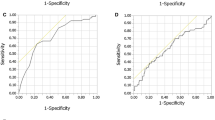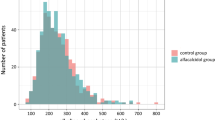Abstract
Hypercalcaemia is an important cause of morbidity in malignant disease. We studied the efficacy and safety of intravenous ibandronate (a new, potent bisphosphonate) in a multicentre study of 147 patients with severe cancer-associated hypercalcaemia which had been resistant to treatment with rehydration alone. Of 131 randomized patients who were eligible for evaluation, 45 were allocated to receive 2 mg ibandronate, 44 patients to receive 4 mg and 42 patients to receive 6 mg. Serum calcium values fell progressively in each group from day 2, reaching a nadir at day 5, and in some patients normocalcaemia was maintained for up to 36 days after treatment. The 2-mg dose was significantly less effective than the 4-mg or 6-mg dose in correcting hypercalcaemia, as the number of patients who achieved serum calcium values below 2.7 mM after treatment was 50% in the 2-mg group compared with 75.6% in the 4-mg group and 77.4% in the 6-mg group (P < 0.05; 2 mg vs others). In a logistic regression analysis, three factors were found to predict response; ibandronate dose (higher doses were more effective), severity of presenting hypercalcaemia (severe hypercalcaemia was associated with less complete response) and tumour type (patients with breast carcinoma and haematological tumours responded better than those with other tumours). Ibandronate was generally well tolerated and no serious drug-related adverse events were observed. We conclude that ibandronate is a safe, well tolerated and effective treatment for cancer-associated hypercalcaemia, which should prove a useful addition to the current range of therapies available to treat this condition.
This is a preview of subscription content, access via your institution
Access options
Subscribe to this journal
Receive 24 print issues and online access
$259.00 per year
only $10.79 per issue
Buy this article
- Purchase on Springer Link
- Instant access to full article PDF
Prices may be subject to local taxes which are calculated during checkout
Similar content being viewed by others
Author information
Authors and Affiliations
Rights and permissions
About this article
Cite this article
Ralston, S., Thiébaud, D., Herrmann, Z. et al. Dose-response study of ibandronate in the treatment of cancer-associated hypercalcaemia. Br J Cancer 75, 295–300 (1997). https://doi.org/10.1038/bjc.1997.48
Issue Date:
DOI: https://doi.org/10.1038/bjc.1997.48
This article is cited by
-
Bisphosphonate zur Behandlung tumorinduzierter Knochenveränderungen
Der Onkologe (2007)
-
High dosage treatment of nitrogen-containing bisphosphonate ibandronate is required for osseointegration of cementless metal implants
Journal of Orthopaedic Science (2005)
-
Rapid administration of ibandronate does not affect renal functioning: evidence from clinical studies in metastatic bone disease and hypercalcaemia of malignancy
Supportive Care in Cancer (2004)
-
Injectable bisphosphonates in the treatment of postmenopausal osteoporosis
Aging Clinical and Experimental Research (2003)



